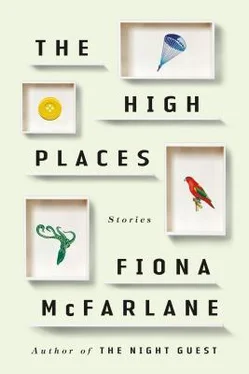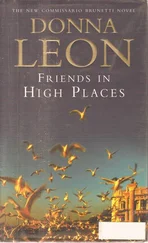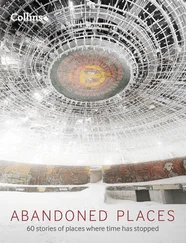That night, the American flag at school stirred at half-mast in the meagre wind. The interned Japanese — doctors and painters and wives and plumbers — wrote letters of panic to the mayor and the police, to the Americans, to the Baptist minister and the Anglican, declaring their innocence in the matter of the crash. I wanted, more than anything, to throw myself into the pond, to touch the surface lightly once, twice, three times, like a skimming stone, and stay there underwater until the sun rose again and Frank was gone.
* * *
Because they hadn’t been buried, the souls of the eight dead airmen began to cause trouble in the area. They played with ladies’ stockings, tearing tiny holes in them that ran and ran. They bit apples on the trees and left them swaying and rotting, with tooth marks. They sent bugs scurrying through oats, and they spooked cows so no bulls could rut. We saw their shadows at times, swimming in the pond among the knees of the Baptists, delaying the return of Jesus because their bodies hadn’t yet been put back together. That, we discovered, was Frank’s job, with the help of the airbase surgeon.
We imagined the airmen gruesomely neat, each a jigsaw of distinct pieces: arms, legs, torso. We rarely thought of the heads. We learned the names of the Americans: James Milner. Curtis McAvoy. Kevin Roberts. Roy Brand. We repeated them over and over, skipping them into our games, clapping out the rhythm. Leroy Bump, of North Carolina. Poor Bump had a nasty bump, we joked. Clarence Sullivan. Eugene Jackson. David Young, who died once and always young. We talked of Frank’s methods, the eight tables accumulating parts and the fitting together of a Sullivan arm with a Sullivan shoulder. We thought of mothers fixing dolls, and of the detachable tails of bloodless lizards.
As Frank’s task wore on and those stubborn pieces would not fit back into eight bodies, we were impressed by his silence, the way he simply sat at dinner with us, chewing and drinking. At night, in bed, I discussed with Nora his nerve and his courage, his secretive profession, and his strict rules about a subject’s suitability for children. No war, no details of other people’s marriages, no religion, no airmen in a scrambled heap. He was unfazed by his difficult and gory work, even when the town, plagued by the dead Americans, became impatient with the time he was taking.
We noticed one difference in him: he became more tender with his children, if not with Nora and me, and seemed to understand the cries of the baby in a way that not even our mother could, walking it on his huge hip and feeding it raisins he had chewed and softened in his own mouth. He read to his children until he became frustrated with them for wanting the same stories over and over again. He taught his boys to play football. Nora and I watched from the veranda as they stumbled and fell on their fat legs, bewildered and violent, knocking each other to the ground.
* * *
After nearly two weeks of concern among the Merrigool citizens, uneasy in the presence of the Americans, alive and dead, and the interned Japanese, with Frank politely accused of incompetence in every kitchen, word came that Curtis McAvoy of Iowa City had never been on the plane at all. He had abandoned the plane and the base on the morning of the crash and found a truck on its way to Sydney — just as our father once had — where he lived it up in the bars and in the soft tanned arms of the Woolloomooloo whores and watched for Japanese submarines sneaking into the harbour. The eight airmen, it turned out, were seven, which explained Frank’s difficulty with their jigsaw bodies.
Our mother cut our hair that day. We sat on the veranda, watchful, quiet, while the lorikeets picked at the afternoon grass. Because the cut was unscheduled and it was a washday, all the towels were wet, so our collars filled up with white hair that clung to our necks and worried us all evening, itchy but elusive. Eventually our mother took Nora inside to help prepare the meal. The rest of us stayed on the veranda listening for any sound through the dusk. The dogs barked at nothing. They barked at birds and each other. Finally they barked because he came.
It took him some time to get out of the car. We all stood when he did, and our mother came to the door. Nora watched from the window through the batter of moths. We realised then how dark it was. He climbed the steps purposefully, looking everything in the eye, and then put his hand on top of my head.
‘We’re all hungry, aren’t we,’ he said, moving his fingers in my hair. ‘We’re a family of good eaters, and we like to sit around a table for our tea.’
We filed in, our bare feet soft on the floor, treading our hair into and around the house. Frank’s belly growled all through dinner, loud and complaining, and he turned this into a joke, holding it in both hands and soothing it like his baby. We laughed at it and fed the dogs with furtive scraps of meat.
* * *
With the seven Americans reassembled at last, Frank took a week off work, and this free week coincided with our school holidays. His presence made the days tricky and unpredictable. He worked all morning beneath sinks, along the fences, hidden in the roof. He chopped down a huge dead tree so that it lay across the yard like a giant squid, pale and horizontal, its enormous sideways branches cut back to stumps. But in the afternoons he lurked in chairs and on steps and by the pond, lazy and hazardous, and we played around him, alert, never nearing the bush or water.
He remained in a good mood, against our expectations, and one day set up an obstacle course of tin cans on boulders and fences. Then he got Nora and me and the boys into the car and told us we’d take turns leaning from the front passenger window to grab as many cans as we could.
‘Someone will get hurt,’ observed our mother, but she did nothing to stop it. She sat with the baby on a rug in the yard, shelling peas, her long fingers working quickly in the shade. It was hot, and hotter in the car. Hotter even when there was a breeze, because the breeze came from the desert and blackened our necks and snot. The car bucked over the uneven ground and we barrelled from side to side in it, collecting tin cans, missing tin cans, awaiting our turn to lean out over the burning metal and squint into the moving, rolling sun. Nora at first refused to try, sitting behind the driver’s seat with the window down, leaving the wind to mess her hair, keeping her eyes on the horizon. Eventually Frank persuaded her, and of course she was the best of us, hanging from the car with one brown outstretched arm and her bum filling the window. Then the youngest boy vomited over the back seat. Frank stopped the car and we all ran and lay on the grass beside the pond, panting and burning. Except Nora, who walked back in the direction of the house. She moved as if she were underwater, lifting each leg higher than necessary, letting her arms trail behind her and turning her head slowly from side to side. Then she stopped and pointed at the sky.
‘Look,’ she said, and we looked. Beside the sinking sun, men were falling. They rocked in the dusty wind, their parachutes opening and catching, and the birds flew away from them and into the trees. We knew where they came down — out on the fields, past the bush by the creek, where the cows had chewed the last of the grass and the ground was powdery ash. Each of us imagined feeling the earth shake, almost imperceptibly, as one by one the men landed, gathering their nets around them and feeling again the weight of the sky. We hadn’t seen them jumping since the plane crashed.
Frank was watching transfixed. He’d never been home when they jumped, and it seemed he’d never watched them from the windows of the station, or his car, or the houses he drove to daily, where thefts and suspicious fires occurred.
Читать дальше












